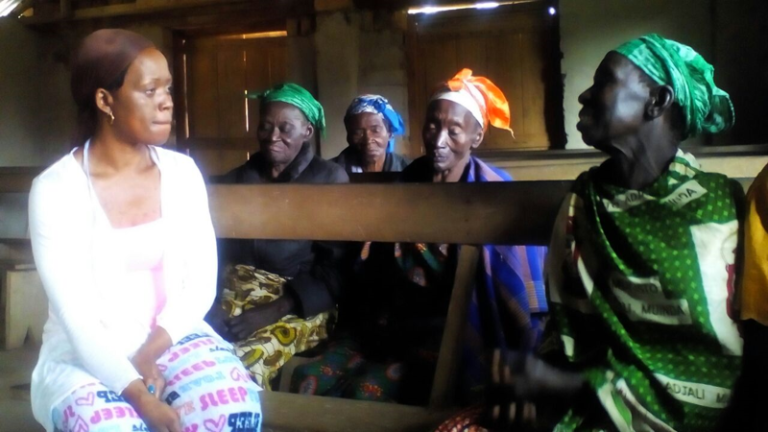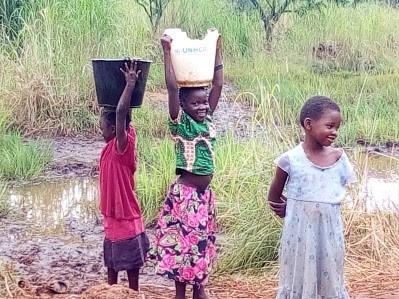Ango Compassionate Hearts – Congo
This project is made possible through the partnership of WATER CHARITY and the NATIONAL PEACE CORPS ASSOCIATION. ![]()
This project has been completed. To read about the conclusion, CLICK HERE.
Location: Ango, Bas Uele Province, Congo-DRC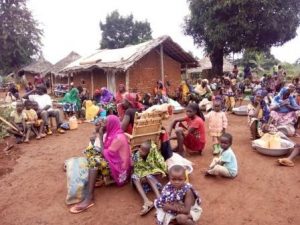
Summary:
Water Charity is pleased to announce that we have begun a comprehensive project for the people on the border of the Democratic Republic of Congo & the Central African Republic. Most of these people are refugees from the ongoing crisis in the CAR, and the aid available in the DRC is minimal at best.
This is an ambitious program involving a series of water filter manufacturing trainings, soapmaking instructions, and also includes medical components as well. Eyeglasses, medical supplies and doctors will be brought to this beleaguered area in addition to the manufacture of on-site BioSand Filters. 100 youths and widows are being trained to make long-lasting BioSand water filters, distribute them, and give sanitation instruction. The net benefit of this effort cannot be overstated. Not only will people be able to deal effectively with the poor water quality, waterborne illnesses and hygiene issues that are rife there, but the trainees will be learning valuable, teachable and commercial skill sets that will enable them to create income while helping others.
Water Charity has paid for all of the WASH elements of this effort. All of the training supplies, molds, tools, soapmaking supplies, teaching, transportation, supplies and local expenses have already been funded by us. The project is being done in partnership with a local group and our friends at Friendly Water For The World, under the direction of David Albert, and there are other donors covering the medical costs. Together we will have a profound effect on the health and wellbeing in the Ango region.
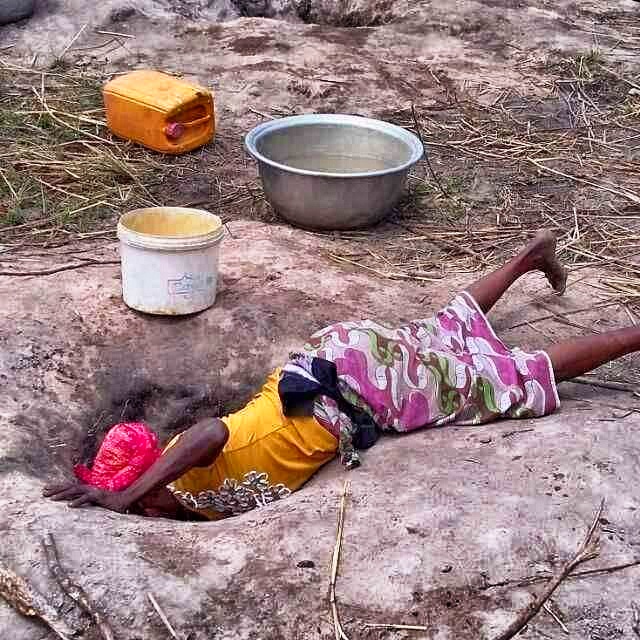 Please consider donating to this effort here. As usual, Water Charity has funded this project out of pocket, and only presents it to you once it is already underway. We ask people to “reimburse” us for funds we already spent, and adopt projects that are already underway or completed, because this allows us to be extremely agile and quick to deliver our aid. We are not raising money for something we envision doing in the future, which can’t start until X amount of dollars is raised. We do projects immediately, and then show our donors what we are actually doing. In this way, you can know that you are contributing to something that is actually happening… NOW.
Please consider donating to this effort here. As usual, Water Charity has funded this project out of pocket, and only presents it to you once it is already underway. We ask people to “reimburse” us for funds we already spent, and adopt projects that are already underway or completed, because this allows us to be extremely agile and quick to deliver our aid. We are not raising money for something we envision doing in the future, which can’t start until X amount of dollars is raised. We do projects immediately, and then show our donors what we are actually doing. In this way, you can know that you are contributing to something that is actually happening… NOW.
Problem Addressed:
Ango is in Bas Uele Province in north-central Congo-DRC, on the border with the Central African Republic. It is a “village”, but, with its surrounding population, has about 100,000 people, all living on subsistence (or sub-subsistence) agriculture. The area is very isolated. Road travel is extremely difficult, and the area is very cut off, as the war in northeast Congo (some 900 miles away) to the east makes supply provision extraordinarily difficult. The provincial capital – Kisangani – is more than 500 miles away (14 hours at under ideal conditions) by road.
There are several schools (some of them currently occupied by refugees). There once was a health clinic, now abandoned, and few or no medical supplies. There are very high rates of child mortality and morbidity, mostly from waterborne illnesses, as well as malaria. Typhoid is an epidemic. Water and sanitation conditions are horrific. There is one well, set up by Ango Compassionate Hearts. Housing consists mostly of grass and thatch huts. There are churches (both Catholic and Protestant), and a mosque. There is no reliable data from the area.
 The ongoing war in the Central African Republic – ostensibly a religious one, including the Lord’s Resistance Army and Muslim insurgents, but really just a struggle for power – and a lack of stability – has sent thousands of refugees, both Christian and Muslim, into the province, in areas around Ango. There is no NGO or United Nations or government presence to deal with them. They are mostly welcomed by the local inhabitants, provided with space to build a hut, and food is shared as people are able.
The ongoing war in the Central African Republic – ostensibly a religious one, including the Lord’s Resistance Army and Muslim insurgents, but really just a struggle for power – and a lack of stability – has sent thousands of refugees, both Christian and Muslim, into the province, in areas around Ango. There is no NGO or United Nations or government presence to deal with them. They are mostly welcomed by the local inhabitants, provided with space to build a hut, and food is shared as people are able.
Project Description:
This is the first of what is likely to be a series of visits. Note that the initial services are not aimed at refugees, but at the permanent residents of Ango. Refugee services may be in our future planning. However, it is a good assumption that the refugees will not be returning home anytime soon, and will be there into the long-term future.
There will be four major elements:
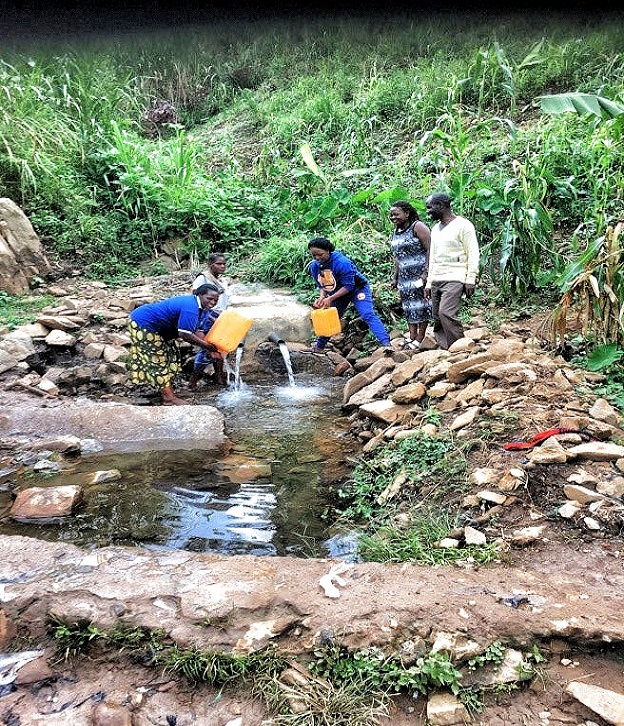 1. Training two groups to build BioSand Filters. One group will be an already existing youth group. The other will be widows nominated by several churches. The lead organizer Neema Paininye (see below) is working to make sure we have teams ready to be trained. We have allocated enough funds so that each trainee (100 total) will be able to get a Filter for their own family at cost.
1. Training two groups to build BioSand Filters. One group will be an already existing youth group. The other will be widows nominated by several churches. The lead organizer Neema Paininye (see below) is working to make sure we have teams ready to be trained. We have allocated enough funds so that each trainee (100 total) will be able to get a Filter for their own family at cost.
2. Training one group in soapmaking. Our team will be trained in soapmaking by Richard Kyambadde, Friendly Water Country Representative in Uganda, and then take the knowledge to Ango. We already have one group in Uganda that has become self-sufficient through soapmaking. (There is virtually no soap to be had in Congo.)
3. An environmental health assessment. Led by Holly Myers (below) we will try to assess where “the low-hanging fruit is”. Where would be the most cost-effective future interventions? Is it better food storage? Water? Mosquitos? Waste disposal? Toilets? Rainwater catchment? Where would an NGO (not necessarily us) get the most “bang for the buck”?
4. Medical care and medicine – Obviously, the needs are overwhelming. Besides helping to lead BioSand training, Dr. Riziki will provide medical services to at least some people. She will, with Neema, purchase needed medical supplies with MAP Medical Missions (with whom Neema has worked before). In the longer run (though we might start now), it would be great to begin to train a team of women in very, very basic nursing care (and how to administer the little in the way of supplies they have). This may be the start of a larger venture later.
Project Impact:
The project aims at beginning the process of ameliorating the conditions faced by the people of Ango and, eventually, refugees streaming into the area. The two BioSand workshops will bring a source of employment to widows and to youth, and provide for the first 100 BioSand Filters to ensure clean water in the community. More than 1,200 people will immediately have access to clean water; over the next 18 months, it should increase to at least 8,000. Soapmaking will provide additional employment, and bring soap to a community that has virtually none. Immediate health care needs will be provided for. An abbreviated environmental health assessment should provide direction for the next steps for the community, and will increase the possibility that other NGOs might be convinced to step in. Contacts will be firmed up with what little local administration there is. Communications with the area will be streamlined.
Neema Paininye, who was born in Ango but who lives in Tracy, California, returns to Ango at least twice a year. She visits with her family (her mother and sister are still there, both often sick with typhoid), brings medical supplies and other things of benefit to the community, and works with community leaders to try to better conditions there. On her most recent visit, she began working with refugees in a surrounding community as well. With difficulty, she also arranged for the construction of a well. She has been in touch with Friendly Water for more than two years, and came to the August 2017 training, where she made many friends.
She writes:
Ango Compassionate Heart’s main goal is to end poverty in the region of Bas Uele, in north central Congo-DRC. Most of our work is done in the village of Ango. We are developing and implementing programs that address the basic human needs so that one day the people of Ango and their surroundings can take the lead within their own communities and develop it. Our program includes four categories:
- Water Sanitation
- Education
- Women’s Programs
- Healthcare
 We are a group of people driven by the desire to bring assistance to the people living in extreme poverty. Our hope is that more people will join us in this effort and partner with us in order to improve the lives of the poor in the Bas-Uele region and around the world. I started life in a tiny, remote Congolese village to very poor parents, yet, by the grace of God, I grew up to earn a degree in psychology at an American university, and returns to the Congo each year to minister to the people of my village.
We are a group of people driven by the desire to bring assistance to the people living in extreme poverty. Our hope is that more people will join us in this effort and partner with us in order to improve the lives of the poor in the Bas-Uele region and around the world. I started life in a tiny, remote Congolese village to very poor parents, yet, by the grace of God, I grew up to earn a degree in psychology at an American university, and returns to the Congo each year to minister to the people of my village.
In 2013, I was burdened for the people of the Congo, especially those in my village of Ango. The people of my village live hopeless, helpless lives, and wake up in the morning not knowing when they will have their next meal. I then decided to start Ango Compassionate Hearts Foundation, with the vision of bringing assistance to the people leaving in extreme poverty in Bas Uele region in the eastern part of the Democratic Republic of Congo.”
Holly Myers (who will be the second trainer) is Environmental Health Director of Yakima Health District, one of the largest health districts in Washington State. She met up with Friendly Water at the annual Washington State Environmental Health Association (WSEHA) Conference three years ago, and had wanted to come to the training since. She brings a wealth of knowledge and 20 years of experience on all aspects of environmental health (though she hasn’t traveled abroad previously), and an encyclopedia of people who can help! She can do an environmental health survey of the entire community. On her return, she can also bring Friendly Water to a larger stage, with environmental health people across the country. We have already scheduled a presentation at WSEHA (being held in Olympia in May).
Dr. Riziki Mupelevendu is a general practitioner who deals primarily with children. She has trained many groups in Congo-DRC in BioSand Filter fabrication and use, including one in Butembo where Filter sales support her health clinic. She has dealt with all waterborne illnesses endemic to Congo-DRC.
Monitoring:
Each group will have a trained monitor, who will go into homes to ensure BioSand Filters are installed properly and are being used correctly. Reports from each group will be due in 90 days, at which time business plans will be adjusted as necessary. An epidemiological questionnaire (before and after), translated into Lingala (the local language) will be administered to all those being trained, and all those who receive BioSand Filters.
Although the funds for this project have been contributed by an anonymous donor, your donation using this Donate button will ensure that we have funds available for our next project in these countries.![]()
